

EdWebET110 - Feelings are not Facts - Google Slides. Andrew Marantz: Inside the bizarre world of internet trolls and propagandists. The Importance, and Incoherence, of Twitter’s Trump Ban. Let’s take the easy question first.
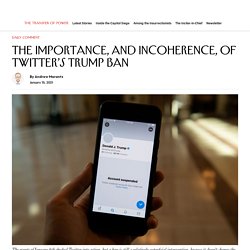
Nothing in the Constitution prohibits a private company from enforcing its own policies; if anything, the First Amendment protects a company’s right to do so. Now the harder questions. (20+) Technology and Democracy after the "Great Deplatforming" How Social Media Made the Trump Insurrection a Reality. This is such a standard trope, such a staple of the American-exceptionalist mythos promulgated by both parties, that it’s easy enough to tune it out.
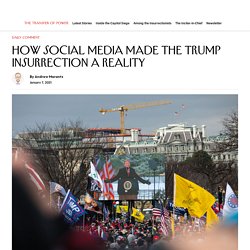
And yet it is also a form of denialism—not as imminently dangerous as the COVID denialism and climate denialism and seditious incitement of Donald Trump, but a form of denialism nonetheless. If Wednesday’s events do not reflect a true America, what could they possibly reflect? Did they happen in another country, or nowhere? Was it all a dream? “Not everything that is faced can be changed; but nothing can be changed until it is faced,” James Baldwin wrote in the Times, in 1962. Trump’s Been Unplugged. Now What? Last week, on Wednesday, January 6th, a mob of Trump supporters descended on the Capitol.
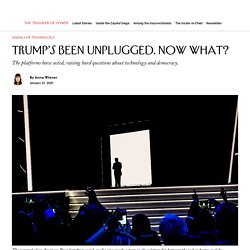
Some carried assault weapons and zip ties; all claimed that the 2020 Presidential election had been stolen—a conspiracy theory of the highest order. The President had stoked and amplified this delusion via Twitter, and, even after the mob had smashed its way into the Capitol, he tweeted encouragement, calling the rioters “great patriots” and telling them, in a video, “We love you. You’re very special.” Twitter blocked a few of these tweets and, by Friday, had permanently suspended his personal Twitter account, @realDonaldTrump. The President’s tweeting was “highly likely to encourage and inspire people to replicate the criminal acts at the U.S.
Trump’s Been Unplugged. Now What? The psychological toll COVID-19 may be taking on Americans. Health experts are concerned about the potential mental health effects of the coronavirus outbreak in the United States, and mental health hotlines report a substantial uptick in calls since the outbreak began.
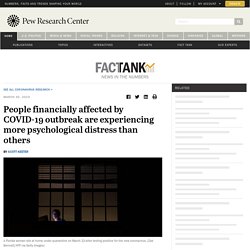
Nearly one-in-five U.S. adults (18%) say they have had a physical reaction at least some or a little of the time when thinking about the outbreak, according to a new Pew Research Center survey conducted March 19-24. This is particularly true of those affected financially. When asked more broadly how they’ve felt in the past seven days, not in the context of the coronavirus outbreak, 18% report experiencing nervousness or anxiety most or all of the time during the past week. For context, a 2018 federal survey – which was not taken in the midst of a national crisis – found 9% of U.S. adults reported feeling nervous most or all of time over the past 30 days, indicating that the current level might be above normal. Conspiracy theories, misinformation, COVID-19, and the 2020 election - The Survey Center on American Life.
Findings from the September 2020 American Perspectives Survey October 13, 2020 Daniel A.
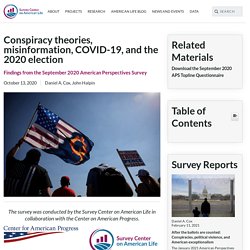
Cox, John Halpin. Our disinformation problem has been 70 years in the making. Today’s disinformation problems far exceed those of the 1950s, in large part because of the amplifying effects of social media.
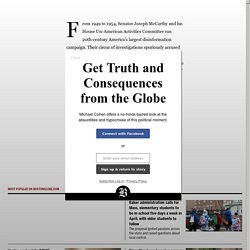
But blaming disinformation solely on the rise of the attention economy overlooks the role of government secrecy and the consequent erosion of public trust. QAnon conspiracy theories and Alex Jones’s deep state mutterings feel less preposterous when you consider that only eight years ago, Edward Snowden revealed America’s secret global surveillance system. And the right is not alone in its conspiratorial thinking — many on the left still believe Trump’s concealed tax returns and shady dealings with Russia imply he was a “Manchurian Candidate”-style sleeper agent. The Psychology of Conspiracy Theories. Editor's Note: The accuracy of the italicized portion of this story has been questioned.
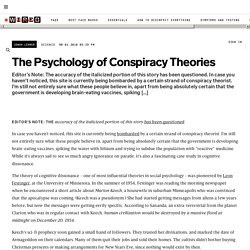
In case you haven't noticed, this site is currently being bombarded by a certain strand of conspiracy theorist. I'm still not entirely sure what these people believe in, apart from being absolutely certain that the government is developing brain-eating vaccines, spiking the water with lithium and trying to subdue the population with "reactive" medicine.
While it's always sad to see so much angry ignorance on parade, it's also a fascinating case study in cognitive dissonance. The theory of cognitive dissonance - one of most influential theories in social psychology - was pioneered by Leon Festinger, at the University of Minnesota. In the summer of 1954, Festinger was reading the morning newspaper when he encountered a short article about Marion Keech, a housewife in suburban Minneapolis who was convinced that the apocalypse was coming. NPR Cookie Consent and Choices. Today, Explained: The military’s far-right problem on Apple Podcasts. NLP offers new, urgently needed lesson on conspiratorial thinking. Part of free e-learning platform Checkology, it teaches people to understand the allure of conspiracy theories and how to avoid them.
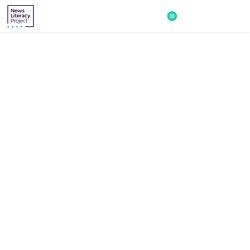
WASHINGTON, D.C., Jan. 19, 2021 — As recent events underscore how easily Americans can be influenced by false conspiracy theories, the News Literacy Project (NLP) is introducing a new lesson to educate students and the public about how conspiratorial thinking develops and its effects. The comprehensive “Conspiratorial Thinking” lesson, included with NLP’s free Checkology® e-learning platform, seeks to help people understand the factors that allow conspiratorial thinking to take hold and conspiracy theories to flourish. It is available to educators and the general public. The Psychology of Conspiracy Theories. Mind Over Media.
Older People Shared Fake News on Facebook More Than Others in 2016 Race, Study Says. When it came to sharing fake news on Facebook during the 2016 election, no age group was quite as active as those aged 65 and older, according to a new study.

The study, published Wednesday in Science Advances, quantifies how aggressive seniors were in spreading misinformation, though the findings suggest that sharing such stories was relatively rare. On average, American Facebook users aged 65 and older posted seven times as many articles from fake news websites as adults 29 and younger, according to the study. And that was true regardless of ideology, education level or political affiliation: Older users just tended to share misinformation more. But before you blame America’s seniors for distorting political discourse, note the study’s main finding: Sharing articles from such disreputable sources was actually pretty uncommon. The authors were careful in defining “fake news,” a term that has been weaponized by many, including President Trump, to dismiss real news they dislike.
Avoiding the Rabbit Hole: How to Recognize and Understand Conspiratorial Thinking. Presented by Shaelynn Farnsworth, National Director of Educator Outreach and Success, The News Literacy Project; and John Silva, Senior Director of Education and Training, The News Literacy Project Sponsored by News Literacy Project Closed captioning will be added to the recording within 2 weeks of the live presentation.Get a CE Certificate for this edWebinar Learn more Conspiracy theories are rampant on social media, particularly related to hyperpartisan political beliefs as well as the COVID-19 pandemic.
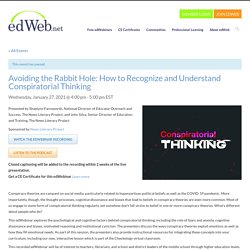
More importantly, though, the thought processes, cognitive dissonance and biases that lead to beliefs in conspiracy theories are even more common. Most of us engage in some form of conspiratorial thinking regularly, yet somehow don’t fall victim to belief in one or more conspiracy theories. - The Washington Post. Pil algorithm study 2020 01 15. Lizard People in the Library. How Librarians Can Fight QAnon. It’s time for a thorough revamping of the purpose of inviting students to engage in inquiry as a civic practice. Educators, including librarians who teach, will need to confront and clarify their own beliefs and assumptions about how they know what is real and what isn’t. It will take work. But there are some promising places to start. First, taking a leaf from an organization formed to advise journalists on how to cover a divisive election, educators should consider ways to frame discussions of knowledge through the lens of democracy rather than through partisan political positions.
Evidence Based Cyber Security. - Transcripts. A Conversation on Media Literacy with Renee Hobbs. Tracking QAnon: how Trump turned conspiracy-theory research upside down. For people around the world, the now-iconic images of a man in a horned headdress roaming the US Capitol during the 6 January insurrection came as a shock. For Kate Starbird, the images were frighteningly familiar. ‘QAnon Shaman’ — the online persona of Jacob Anthony Chansley, or Jake Angeli — is a known superspreader of conspiracy theories that her research group has been monitoring for years. The storming of the Capitol was “this physical manifestation of all of these digital characters we’ve been studying”, says Starbird, a social scientist at the University of Washington in Seattle, who investigates the spread of disinformation on social media. Conspiracy theories went wild in 2020. Psychology can tell us why. 2020 was a banner year for conspiracy theories.
First there was the proliferation of QAnon, whose followers insisted that Donald Trump was all that stood between us and a “deep state” cabal that was running a global sex trafficking ring and harvesting a chemical from children’s blood. Fact check: RFID microchips will not be injected with the COVID-19 vaccine, altered video features Bill and Melinda Gates and Jack Ma. 25% in US see at least some truth in conspiracy theory that COVID-19 was planned. Britney Spears and the Mainstream Media’s Matt Lauer Problem. Tabloids and the paparazzi are clear villains in the story, but Framing Britney Spears also recasts moments that were considered more anodyne at the time, serving as a subtle and clever form of media criticism.
Half an hour in, Matt Lauer arrives—now disgraced, but at the time a top NBC anchor calmly interrogating Spears on Dateline. “You’ve got all these legitimate people weighing in, saying, ‘You know what? That’s dangerous. And she put her child at risk,’” he says, talking about paparazzi photos of her driving with her infant son in her lap. He continues, “You saw the questions that were being asked: ‘Is Britney a bad mom?’” Cookie Consent and Choices. Cookie Consent and Choices. A Vast Web of Vengeance. Ms. Atas vanished from the public record for the next nine years. But around 2001, according to Ontario court filings, she was arrested and charged with assault and resisting arrest. The charges were ultimately withdrawn, but a peace bond, Canada’s equivalent of a restraining order, was issued against her. Ms. Atas moved into one of the apartments in her Toronto building, which was the subject of complaints from tenants.
Ms. Ms. Media Literacy Resources by @wfryer - Conspiracies and Culture Wars. Why Is This Happening? with Chris Hayes: The End of RealDonaldTrump with Kara Swisher on Apple Podcasts. Deplatforming the President - What Next Plus. The Importance, and Incoherence, of Twitter’s Trump Ban. Inside Twitter's Decision to Cut Off Donald J. Trump. QAnon's 'Meme Queen' Marches On. ‘I Answered the Call of My President’: Rioters Say Trump Urged Them On.
'I had no qualms': The people turning in loved ones for the Capitol attack. The QAnon orphans: people who have lost loved ones to conspiracy theories.